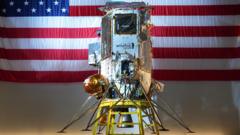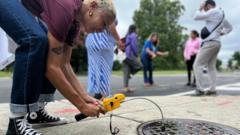Trinidad's carnival, known for its vibrant costumes and joyful celebrations, is being transformed through sustainability efforts led by initiatives like Carnicycle and eco-conscious entrepreneurs, aiming to minimize the environmental impact of the festivities.**
Trinidad Carnival Embraces Sustainability Amidst Festive Traditions**

Trinidad Carnival Embraces Sustainability Amidst Festive Traditions**
Local initiatives focus on reducing waste and promoting a greener carnival experience in Trinidad.**
From its richly adorned costumes and electrifying music to the throngs of revelers dancing in the streets, Trinidad's carnival is celebrated as "the greatest show on Earth." However, the extravaganza also faces environmental challenges, producing an estimated 3.4 tonnes of waste annually. A local initiative, Carnicycle, co-founded by Danii McLetchie in 2018, seeks to tackle this issue by promoting sustainability at the heart of the festivities.
Carnicycle's efforts focus on addressing the significant carbon emissions associated with carnival costumes, with a single costume bra generating roughly 37.68 kg (83 lb) of CO2. Danii recognizes the cultural significance of carnival, but emphasizes the urgent need to mitigate its environmental effects, urging the community to reconsider how costumes are created, used, and disposed of.
In a bid to divert waste from landfills, Carnicycle launched a recycling program, collecting unwanted costume materials that would otherwise be discarded. They set up collection bins at hotels and various venues, effectively salvaging around 10,000 pieces of costume materials in the past year alone. The recovered components, such as feathers and beads, are sold to costume designers and those in the burlesque industry, creating a circular economy around carnival attire.
In addition to costume recycling, Carnicycle introduced a backpack rental service, allowing masqueraders to borrow large costume pieces without the burden of carrying them throughout the parade. "I’m paying this much money but then it’s heavy," recounts Danii, expressing how this innovative solution alleviates physical strain while enhancing the carnival experience.
Complementing Carnicycle's efforts is a pop-up thrift shop called 2nd Closet, launched by lawyer Aliyah Clarke and fashion designer Kaleen Sanois. The duo encourages recycling by selling pre-owned clothing and creating tutorials on transforming costumes into fashionable beachwear or everyday outfits. Their venture also offers closet-sorting services, helping individuals reclaim items for resale, which was exemplified by an opportunity to sort through the wardrobe of renowned soca artist Machel Montano.
Sustainability stretches beyond costumes at the carnival's events, as seen at the popular "Fete with the Saints." Organizers have committed to using biodegradable tableware and reusable cups, while employing "bin detectives" to enhance waste sorting and recycling efforts. This has reportedly resulted in capturing more recyclables than in previous years, with assertions that over one million single-use plastics have been prevented from reaching landfills.
Joseph Hadad, a co-chairman of the organizing committee, affirmed that while these green measures may introduce additional costs, they have ultimately enhanced the event without dampening the jubilant spirit of the celebration. Patrons, like Roland Riley, have lauded the initiative as a commendable step toward environmental responsibility during such a cherished cultural event.
Trinidad's carnival not only showcases its vibrant traditions but is also embracing the call for sustainability, crafting a legacy that honors both cultural celebration and environmental stewardship.























